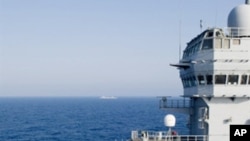NATO boosted its bombardment of Libya Saturday, for the first time sending attack helicopters on low-altitude missions against military installations loyal to Libyan leader Moammar Gadhafi.
NATO said British Apache helicopters destroyed a radar site and an armed checkpoint in their first deployment since British Prime Minister David Cameron approved their use a week ago. The Apaches are each equipped with 16 Hellfire missiles that skim low across the landscape toward targets that are pre-set by radar before the missiles are launched. French Tiger helicopters are also being readied for NATO use in Libya.
The commander of NATO's forces in Libya, Canadian Lieutenant General Charles Bouchard, said the successful assault "demonstrates the unique capabilities" of the attack helicopters. The use of lower-flying helicopters for attacks could diminish the possibility of civilian casualties, although they also could be vulnerable to strikes by surface-to-air missiles.
In recent days, rebels trying to oust Gadhafi have been waiting for use of the attack helicopters. One rebel leader in Misrata, Fatih Bashagha, said the fighters are happy about their use, and other rebels said it showed a renewed NATO commitment to assisting them.
The increase in the military campaign came even as new diplomatic efforts were seen in the effort to get Mr. Gadhafi to give up power.
China says its ambassador to Qatar has met with the head of Libya's rebel council, the first time China has revealed such contacts. Chinese officials said they stand by their position that the Libyan crisis should be resolved politically and that the country's future must be decided by its people.
Also, Russia is sending a special presidential representative, Mikhail Margelov, to Benghazi, to meet with the rebels. French Foreign Minister Alain Juppe said Friday that Gadhafi is "increasingly isolated." Juppe also said that France is working with those close to the Libyan leader to persuade him to leave.
For the last several nights, NATO warplanes have bombed targets in Tripoli, including Mr. Gadhafi's sprawling residential and command compound. Mr. Gadhafi has rarely been seen in public since a NATO airstrike killed one of his sons in April.
On Friday, United Nations officials criticized Qatar's forcible deportation of a Libyan woman who says she was gang-raped by troops loyal to Gadhafi.
Officials with the U.N. refugee agency said Imad al-Obeidi had been awaiting resettlement as a refugee and that UNHCR was in the process of preparing papers for her departure from Qatar to a third country. The officials said al-Obeidi's deportation to Benghazi is against international law.
State Department spokesman Mark Toner said the U.S. is concerned for al-Obeidi's safety and has been working to ensure she finds "appropriate asylum." Toner said U.S. officials have spoken to her in recent days.
Al-Obeidi burst into a Tripoli hotel in March to tell foreign journalists she had been raped by government troops, saying she was targeted because she is from Benghazi. Her rape claim could not be independently verified.
Libyan authorities have called al-Obeidi a drunk, a prostitute and a thief.
Western governments say they believe that, through a combination of diplomatic pressure and military action, they are wearing down Mr. Gadhafi's ability to control Libya.
However, the U.S. role in the conflict has been controversial at home, with the House of Representatives on Friday passing a non-binding resolution calling on President Barack Obama to provide a compelling rationale for the American military involvement in Libya. The White House called the resolution "unnecessary and unhelpful."




